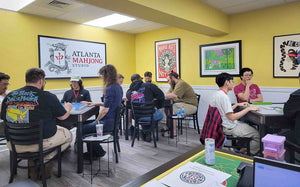"How Much Does an Automatic Mahjong Table Cost?"
And Why You Should Probably Just Use Ours Instead
If Mrs. K got a dime every time someone asked, “How much does this table cost?” she could buy another auto table.
Automatic mahjong tables are one of the first things people notice when they walk into Atlanta Mahjong Studio. They light up, shuffle, hum softly, and rebuild the wall like a tiny robot miracle. And yes, they’re incredible. But they also weigh as much as a refrigerator full of bad decisions.
Before you start Googling “cheap auto mahjong table,” let’s talk about what you’re actually signing up for.
You Don’t Need One to Play Mahjong
People have been playing mahjong for generations without electricity, Wi-Fi, or user manuals translated by Google. All you need is a table, four chairs, and friends who will actually show up.
An auto table just saves time between games. It’s a luxury, not a requirement. If you play once a week, stacking tiles manually is perfectly fine. If you play every night, okay, maybe automation makes sense. But if your main exercise is moving the laundry off your dining table before dinner, you can probably skip the investment.
A Few Things the Ads Won’t Tell You
1. They’re heavy.
About 300 pounds, give or take. Some have wheels and folding tops, but “portable” is generous. Moving one across your living room is like convincing a cow to go upstairs.
2. They claim territory and never give it back.
Atlanta basements are full of pool tables and treadmills that were absolutely going to get used every weekend. Now imagine that, but requiring four people at once.
3. Your tiles won’t work.
Auto tables use special magnetized tiles. That beautiful set your aunt brought from Hong Kong? Sorry, those are now purely decorative.
4. They need power.
You’ll need an outlet close by and some cable management that doesn’t involve tripping your guests. Also, check the voltage before you plug it in. Some tables sold in the U.S. have already been converted for 120 V power, but many imported models still expect 220 V. If you’re not sure, plan on buying a converter, or at least keeping a fire extinguisher nearby.
5. They’re machines, not magic.
Eventually something will stick, squeak, or misfeed. You’ll either become an amateur repair tech or start calling it “quirky.”
6. They’ll gleefully eat whatever falls in.
Crumbs, lint, cat hair, Legos — the table doesn’t care. Once it’s inside, it’s part of the system now. And if the machine decides it doesn’t like it, that’ll be the end of your smooth game rotation. (It’s basically the world’s least forgiving Roomba.)
What They Actually Cost
Riichi Tables (Japanese-style)
Entry-level Riichi tables start around $2,800, and tournament-grade versions—with scoring displays and Dora indicators like Mrs. K’s—run between $5,000 and $15,000.
All of them come from Japan, and you’ll need to factor in shipping, tariffs, and import fees, which usually add another $1,000–$1,500 to the total. These tables are built for competitive play and are incredible to use, but they’re definitely an investment.
Unless you have a contact in Japan or enjoy corresponding in machine-translated katakana, you’ll need a U.S. distributor, which may also incur additional fees.
Chinese / Hong Kong Tables
With the exception of Japan-made Riichi tournament tables, every other automatic table on Earth is made in China—all of them. There isn’t a secret high-end manufacturer somewhere else.
Some companies (especially those catering to American-style players) add decorative trim or custom branding, but the machine underneath is made in China.
So if you need a replacement part, it’s...coming from China.
If you need setup help, you’ll be watching a YouTube tutorial with English subtitles that sound like someone’s auntie wrote them.
Mrs. K’s commercial-grade tables—the same type we use for Hong Kong play—run around $2,200 each. Shipping adds to that, and it can increase dramatically if the table isn’t already stocked in the U.S. and has to come directly from China.
If you’re handy, have reliable playing partners, and strong opinions about furniture layout, go for it. They’re genuinely fun once they’re running.
Quick Buyer’s Reality Check
Pros: Speeds up play. Feels fancy. Impresses your cousins. Excellent surface for folding laundry. Chairs double as a clothing rack.
Cons: Heavy. Pricey. Ships from China or Japan. Instructions in poetic broken English.
Or, You Could Just Play Here
At the studio, the tables are already here, leveled, cleaned, and occasionally sweet-talked back into alignment. You walk in, sit down, and play.
No shipping delays. No customs paperwork. No 300-pound conversation piece in your basement.
A seat at one of our Hong Kong auto tables costs about $3.75 an hour, and the longer you play, the lower the price. That’s less than a coffee for a perfectly tuned table, air-conditioning, snacks, and opponents who won’t ghost you after one round.
So before you invest thousands of dollars and half your living room or basement, come play on ours. We already made the mistake for you, and we’re happy to share.






